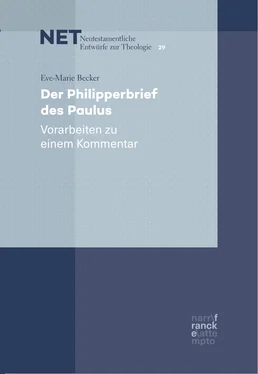In many ways, Paul’s letter to the Philippians is an interesting test case for the study of reformatory exegesis: The topics of “law,” “faith” and “circumcision” appear most prominently in Phil 3. Likewise, Paul’s polemics against those who practice “mutilation” (3:2) is of constant interest for studying Philippians in light of the NPP or RNP.6 So far, however, the role of Paul’s letter to the Philippians for reformatory theology has not been studied systematically.7 This applies despite the fact that reformatory exegesis has – based on Pauline exegesis – produced fresh ideas about Paul and his life course as the discussion about the interpretation of Phil 4:3 most impressively shows.Clemensstrom3.448BWeiß, Bernhard071 Kor07071 Kor07,88
In this contribution, I shall provide some observations on Philip MelanchthonMelanchthon, Philip(p)’s approach to Philippians. Beside a rather “Lutheran”-inspired reference to Philippians in his Loci Communes (see 2.), Melanchthon shows multiple hermeneutical interests when reading and interpreting Paul’s letter to the Philippians. Melanchthon’s multi-faceted interest in Philippians becomes evident especially in his “ Oratio in funere reverendi viri D. Martini Lutheri ” from 1546 (see 3.).
2. MelanchthonMelanchthon, Philip(p)’s interpretation of Philippians in the Loci Communes (1521)
Protestant theology in the first half of the 16 thcentury emerged in a specific historical context, where its theological pragmatics (justification of the believer) and hermeneutical principles (“Schriftprinzip”) had socio-political relevance (critical attitude towards religious authorities).Melanchthon, Philip(p)1 In this context, the theologoumenon of justification played an important role. Gerhard EbelingEbeling, Gerhard once has pointed out that LutherLuther, Martin’s idea on the justification sola fide cannot be seen as an
arbitrary preference of a favorite teaching …, but rather as a declaration of what the inner structure of all theological assertions are about.Ebeling, GerhardRechtfertigungLuther, Martin2
EbelingEbeling, Gerhard’s statement, however, also implies that biblical theology and Pauline exegesis in particular is the material center of Lutheran hermeneutics. In a similar way and inspired by LutherLuther, Martin’s hermeneutics,Melanchthon, Philip(p)3 MelanchthonMelanchthon, Philip(p) makes use of the theologoumenon of justification. His interpretation of Paul’s letter-writing is widely informed by a Lutheran theological hermeneutics.
2.1. MelanchthonMelanchthon, Philip(p)’s approach to Philippians in the Loci
MelanchthonMelanchthon, Philip(p)’s approach becomes evident in his most prominent writing, his “Hauptwerk,”Melanchthon, Philip(p)1 which at the same time is commonly known as the first “protestant dogmatic”: the Loci Communes (1521). Melanchthon formulates one of the central theological statements already in the introduction (0.13):
Nam ex his (= vis peccati, lex, gratia [0.12]) proprie Christus cognoscitur, siquidem hoc est Christum cognoscere beneficia eius cognoscere, non, quod isti docent, eius naturas, modos incarnationis contueri.Melanchthon, Philip(p)2
In his comment to this Locus , Horst Georg Pöhlmann emphasizes how MelanchthonMelanchthon, Philip(p) partly has based this thesis of protestant theology on his reading of Paul (see “ Declamatiuncula in Divi Pauli Doctrinam ”, 1520). Melanchthon partly refers to LutherLuther, Martin’s “Heidelberger Disputation” (1518) and Luther’s Operationes in Psalmos (1519-1521).Melanchthon, Philip(p)3 How can we best describe the potential of “protestant” – or, more specifically: Lutheran – hermeneutics as articulated here?
There are two hermeneutical insights implied in MelanchthonMelanchthon, Philip(p)’s proposition – one is critical or analytical, the other one is constructive:Melanchthon, Philip(p)JerusalemLuther, Martin4 The critical or analytical dimension leads to a substantial deconstruction of a theologia gloriae , as represented by Scholastic theologians like Thomas of AquinasMelanchthon, Philip(p)5 (… non, quod isti docent, eius naturas, modos incarnationis contueri ). It leads, at the same time, to a disclosure of what beneficium actually contradicts ( vis peccati, lex, gratia , 0.12).
In a constructive sense, MelanchthonMelanchthon, Philip(p) shows how the perception of Christ is defined (… hoc est Christum cognoscere beneficia eius cognoscere …) and what “beneficium” ex positivo means and presupposes ( vis peccati, lex, gratia ). The “constructive potential” of Melanchthon’s theological proposition becomes most evident in the way in which he later on in the Loci explicitly refers to Paul and his letter to the Philippians (7.34; 7.90f.):
(a) In 7.33f., MelanchthonMelanchthon, Philip(p) discusses the fact that justification is not yet reached completely. He refers to LutherLuther, Martin as well as to Augustine, Cyprian and Paul (RomRom 7:23; 12:2). Melanchthon claims: “… quatenus credimus, liberi sumus, quatenus diffidimus, sub lege sumus .”Melanchthon, Philip(p)6 In that context, he adds a reference – not a direct quotation7 – to Phil 3:12 in order to show that Paul himself was conscious about the continuous need of aiming for “perfection.” I cannot discuss here in detail how Melanchthon interprets the meaning of “law.” More importantly, the basic idea here is to shape in a noetic sense an “Existenzbeschreibung” that follows up the distinction between credimus = liberi sumus, and diffidimus = sub lege sumus .
In other words, MelanchthonMelanchthon, Philip(p) develops a type of a Christ-believing Existenzbeschreibung in which the “law” has a constitutive function for the believer’s selfSelbst, self, selfhood-understanding. From this point of view, Melanchthon also approaches Phil 3:12 – a text that can be read differently from a modern exegetical perspective. When Paul talks about his imperfection in Phil 3, he points to his eschatological hope (Phil 3:14) as well as to his current personal situation: the biographical context in prison (Phil 1:7 etc.). Paul does not necessarily develop an anthropological statement but rather reaches an interpretation of his personal fortune, which might be of relevance for his “imitators” (see Phil 3:17) who are like himself emulators of Christ.
(b) Another example of how MelanchthonMelanchthon, Philip(p) approaches Philippians via the hermeneutical key of iustitia ex lege , can be found in his interpretation of Phil 3:8f. The Pauline passage is still framed by Paul’s autobiographical narratio (Phil 3:4bff.). Herein, it refers to Paul’s selfSelbst, self, selfhood-understanding as a personal example to his readers. In his interpretation of that passage in the Loci (7.90f.), however, Melanchthon reads the Pauline statement in light of the theologoumenon of the iustitia ex deo est (per fidem est Christi). We, thus, get the impression that Melanchthon, again, narrows Paul’s thinking, such as in his letter to the Philippians, in that he makes it first of all to be a contribution to the theological discourse about iustitia and lex .
Is MelanchthonMelanchthon, Philip(p)’s approach to Phil 3 legitimate in terms of hermeneutics? In a motific sense it is: In Phil 3:9 Paul talks about πίστις, νόμος, and δικαιοσύνη. However, in the argumentative frame of Phil 3 it becomes evident that the theologoumenon of justification does not really stand in the center of the Pauline argument but only supports Paul’s conceptualization of his own personal exemplum exemplum that he provides for his readers. In his interpretation of Phil 3 in the Loci Melanchthon thus narrows or even misconceives Paul’s crucial argument of apostolic selfSelbst, self, selfhood-reflection.
Читать дальше












